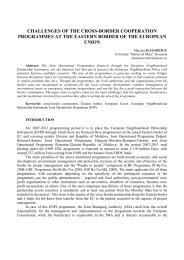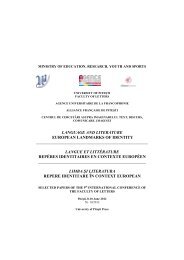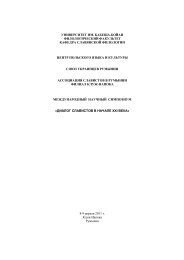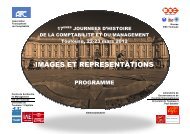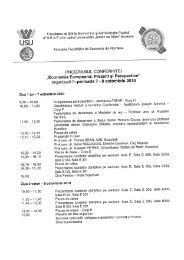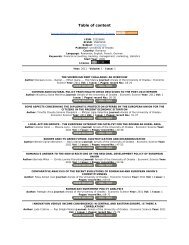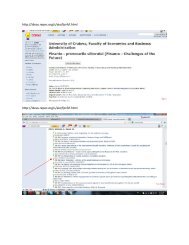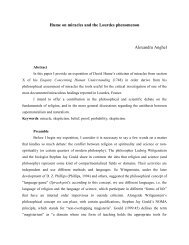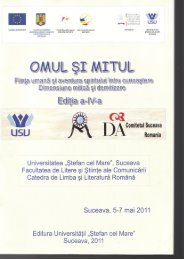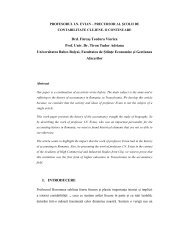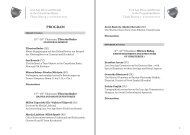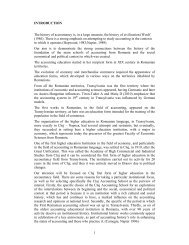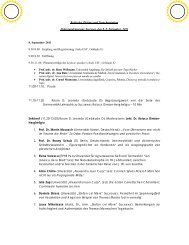La traduction caduque, retraduction et contexte culturel (en ...
La traduction caduque, retraduction et contexte culturel (en ...
La traduction caduque, retraduction et contexte culturel (en ...
You also want an ePaper? Increase the reach of your titles
YUMPU automatically turns print PDFs into web optimized ePapers that Google loves.
LA SÉRIE NOIRE, BESOIN OU VOLONTÉ DE<br />
(RE)TRADUCTION<br />
Marc BLANCHER 1<br />
Abstract: Fr<strong>en</strong>ch publishing imprint, founded in 1945 by Marcel Duhamel, a<br />
Fr<strong>en</strong>ch actor, publisher, scriptwriter and translator, Série Noire (published by<br />
Gallimard) has released a collection of crime fiction of the hardboiled<br />
d<strong>et</strong>ective thrillers vari<strong>et</strong>y, for example Raymond Chandler, Dashiell Hamm<strong>et</strong>t<br />
or Ed McBain. But the translation of these works had be<strong>en</strong> adapted for the<br />
Fr<strong>en</strong>ch readers of the postwar period. In this article it will be analysed the<br />
complex interaction b<strong>et</strong>we<strong>en</strong> translation and mom<strong>en</strong>t of publication and why<br />
many of these works have be<strong>en</strong> oder will be newly translated very near the<br />
original.<br />
Keywords: crime, fiction translation, publication, Fr<strong>en</strong>ch readers.<br />
Créée <strong>en</strong> 1945 par Marcel Duhamel, la Série Noire, qui doit son<br />
nom au poète français Jacques Prévert (1900-1977), compte parmi les<br />
grands noms de collections littéraires <strong>en</strong> France <strong>et</strong> a permis de faire<br />
découvrir au lectorat hexagonal la littérature d’origine américaine dite<br />
hard boiled (littéralem<strong>en</strong>t dur à cuire) de P<strong>et</strong>er Cheyney à Horace Mac<br />
Coy <strong>en</strong> passant par James Hadley Chase, Dashiell Hamm<strong>et</strong>t <strong>et</strong> Raymond<br />
Chandler. Même si des auteurs français y font leur <strong>en</strong>trée dès 1949, à<br />
l’image de Serge Arcouët, la plupart le font sous des pseudonymes<br />
anglo-saxons. Le premier titre français à connaître le succès est Touchez<br />
pas au grisbi ! d’Albert Simonin, <strong>en</strong> 1953. Malgré ces avatars français,<br />
l’ess<strong>en</strong>tiel de la production restera <strong>en</strong>core pour longtemps<br />
ess<strong>en</strong>tiellem<strong>en</strong>t anglo-saxonne. Et qui dit production originale <strong>en</strong> langue<br />
étrangère dit égalem<strong>en</strong>t besoin de <strong>traduction</strong> <strong>en</strong> français : depuis la<br />
dernière déc<strong>en</strong>nie du XXe siècle, nombre de ces <strong>traduction</strong>s, dont celle<br />
de Marcel Duhamel <strong>et</strong> d’H<strong>en</strong>ri Robillot (<strong>en</strong>tre autres), ont été remises <strong>en</strong><br />
question. L’auteur de néo-polar Didier Da<strong>en</strong>inckx est même allé jusqu’à<br />
parler de <strong>traduction</strong> « fantaisiste ».<br />
1 Université Clermont-Ferrand (Blaise Pascal – France) <strong>et</strong> Université Ratisbonne<br />
(Allemagne), blanchermarc@yahoo.fr.<br />
137



